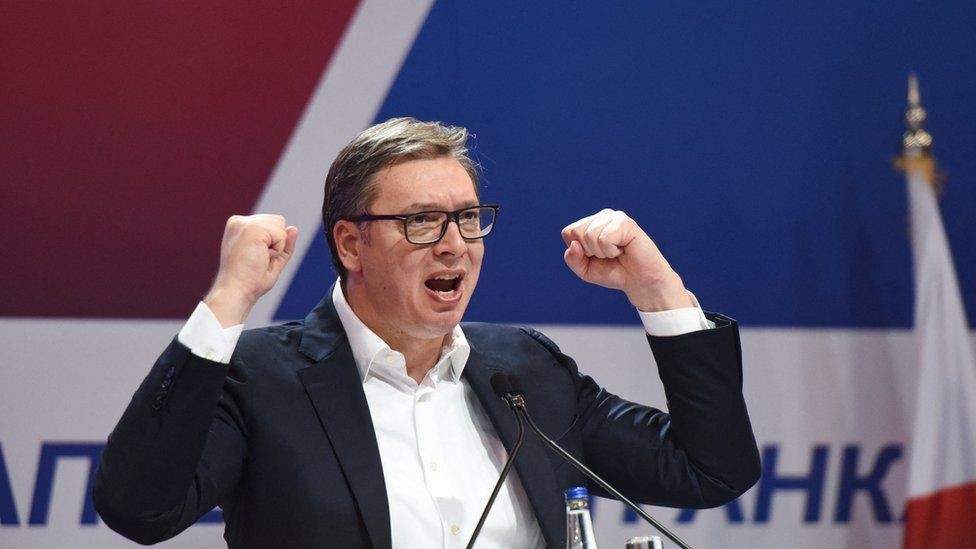Serbian President Aleksandar Vučić has issued a cryptic warning and if it is what we think it is, there’s going to be carnage.
On March 26th, Serbian President Aleksandar Vučić issued a foreboding warning through his Facebook page, alerting the nation to an imminent yet unspecified threat that could significantly impact Serbia and Republika Srpska in the forthcoming days. Republika Srpska, where 83% of the population are ethnic Serbs, represents one of the two autonomous entities within Bosnia and Herzegovina, the other being the Federation of , predominantly inhabited by Bosniaks and Croats. Vučić’s message underscored the gravity of the situation, hinting at challenges that would test Serbia’s resilience more than ever before.
Join us on Telegram: https://t.me/tfiglobal
Speculation regarding Vučić’s cryptic message points to two plausible scenarios. First, the escalation of the Kosovo conflict, possibly triggered by Kosovo’s bid to join the Council of Europe, which will threaten Serbia’s national interests. Alternatively, the warning could pertain to changes in Bosnia’s electoral laws proposed by UN High Representative Christian Schmidt, potentially destabilizing the delicate balance in the region. As Serbia braces for these challenges, Vučić’s commitment to overcoming the impending difficulties underscores a resolve to safeguard national interests amidst growing uncertainties.
The speculation that Serbian President Aleksandar Vučić’s recent cryptic warning pertains to Kosovo’s potential accession to the Council of Europe (CoE) gains credibility from recent events and statements. On March 22, Vučić expressed Serbia’s strong opposition to Kosovo joining the CoE during an interview with Prva TV, indicating that such a development could have significant repercussions for the region’s geopolitical dynamics. His statement, “You go with that and then we’ll see if Serbia stays in the Council of Europe or not,” highlights the seriousness with which Serbia views this issue.
Read More: US Sanctions Serbian Companies for Russian Military Links
The CoE, with its 47 member states, plays a crucial role in promoting the rule of law in Europe. Serbia’s stance, as articulated by Vučić and supported by Ana Brnabic, the speaker of the Serbian parliament, suggests that Serbia views the potential admission of Kosovo into the CoE as a violation of these principles. Brnabic emphasized that Serbia considers leaving the CoE if it compromises its values by admitting Kosovo, which Serbia perceives as a move that would amount to hypocrisy and charade.
Adding to the context, Russian President Vladimir Putin’s recent comments on the 1999 bombing of Yugoslavia and its portrayal as a tragic event initiated by the West further intensify the situation. Putin’s remarks, made just three days before Vučić’s warning, resonate with Serbia’s long standing grievances over Western interventions in the region.
These developments collectively underscore the depth of Serbia’s concerns regarding Kosovo’s CoE membership bid and the potential geopolitical fallout from such a move.
The potential for political upheaval in Bosnia and Herzegovina (BiH), hinted at by Serbian President Aleksandar Vučić, could indeed stem from controversies surrounding the Office of the High Representative (OHR). Established under the Dayton Treaty in 1995 to ensure peace and order post-conflict, the OHR holds significant legislative and executive powers, including veto authority. This arrangement, however, has been a consistent point of contention, particularly among Serbs, who perceive the OHR’s interventions as biased against Republika Srpska (RS), the Serb-majority entity in BiH.
Read More: Apart from Ukraine, Yemen and Palestine, US is secretly destroying Serbia too
Currently, tensions are escalating as the High Representative prepares to unilaterally amend BiH’s electoral law by year’s end, a move seen as controversial and undemocratic by many in RS. In defiance, President Milorad Dodik of RS, aligned politically with Vučić, has declared that RS will not recognize the new legislation and plans to implement its electoral law. This defiance threatens to fragment BiH’s political, legal, and administrative unity further, raising fears of renewed ethnic conflict.
The Dayton Treaty was never a permanent solution but a temporary measure to halt violence. With RS’s refusal to acknowledge the OHR’s upcoming legal amendments, the fragile peace brokered by the Dayton Treaty risks dissolution. This looming crisis, potentially leading to a breakdown in BiH’s governance and a resurgence of ethnic tensions, may be the “major threat” Vučić alluded to, signalling a critical juncture for Serbia, RS, and the region at large. However, these developments remain speculative until more concrete actions are taken.
